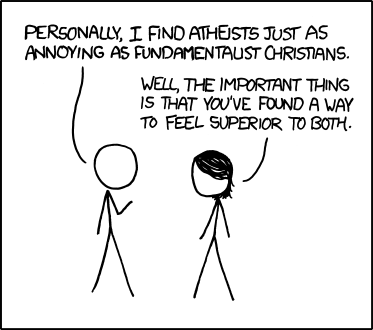...Well, it isn't, but not the way some Christians suggest.
It pleases me — PLEASES, I SAY! — when Christians (typically of the more liberal variety) attempt to claim that religion isn't a problem, it's just that damn
organized religion that's problematic! To which I say, "Bollocks!"
What can I say? There was a
vote on a ban of gay marriage in North Carolina recently and I found an article about it and in that comment section (it was on MSNBC, but I'm not sure which article or where to find the exact comment now) some Christian was going off about how Christians can't take the moral high-ground because of prior moral failings (agreed), but then seemed to blame this on "organized religion" and had to make it clear he was not an "Atheist" (with a capital "A" because, I suppose, he thinks atheism is
a religion). This really causes me to facepalm when I see that there is
one survey (how well this was conducted, I do not know) that found about 97% of atheists/humanists support legal gay marriage. (Also,
Gallup finds that 89% of non-Christians support gay marriage.) And this guy seemingly wants to distance himself from such a group to make it clear he belongs to the Christian club, or at least a religion. Or maybe he thinks atheists eat babies or are communists who worship government? Most of all, I suspect he's trying to make himself feel superior. It reminds me of the
xkcd comic.
Which brings me right to my biggest point on this issue: there is really no such thing as religion without organization. This commenter goes out of his way to point out he's not an atheist. Why? Seriously,
why? As I already suggested, I suspect he's trying to make it clear that he is himself a Christian (without having directly said so). But why is that important? If you think organized religion is so horrible, why imply that you are a member of the group? Perhaps he's afraid of social consequences for denouncing religion. Which brings me to the reality that religion needs organization to survive. I
credit the fact that I am an atheist much to not having a religious upbringing. I didn't have to fight off years of people telling me that a god is real. Granted, my parents could have brought up religion in the home more often than they did (which was virtually never), and if they had, I might not be an atheist.
But what about my children (when Amy and I get around to adopting)? I'm not going to be teaching them religion as literal truth. I doubt Amy would, either. So where could they possibly pick up religion? I mean, without organized religion? Could some friends teach them about religion? Maybe, but those friends might also believe Spiderman is real, too. So when Spiderman becomes fake, so does religion. At best, I would say, they might come up with something of their own, but would they get into anything like Christianity? Probably not.
I raise this because there have been cases of the children of atheists becoming religion. Some, even pastors (i.e,
William Murray and
Stephen Kagin). But would this have happened without organized religion? So often I hear stories from atheists who began life as non-religious or not devoutly religious and then got pulled into church or a college prayer group through friends. That's organized religion, even if the organization may be relatively small in comparison to, say, a juggernaut like the Catholic Church. Never have I heard anyone claim that they became religious from a friend
merely telling them about Jesus. No, it seems to take some sort of church experience to convert.
Think about that. If parenting were the primary way to pass on a religious belief and there were no effective conversion methods, specific religions would gradually fade away as parents, such as mine, fail to pass on their beliefs. Now, new religions may — and probably would — spring up from people creating new religions, but even those wouldn't last. About all that might last are the simplest of beliefs. People still believe in astrology, for example, but it is relatively simple. At least it seems to be that way anymore. At one time, I think it used to be quite more complex, by which I mean people spent much more time actually looking at the alignment of the stars and planets because they actually thought that mattered. Today? It wouldn't surprise me if many astrologers know the position of planets, but recognize that all they really do is make up stuff in horoscopes. More importantly, though, there are no scriptures or really any dogma that is tied to such a belief. Just think about that for one, brief minute. What is the Bible, after all? It is an
organized collection of stories, poetry, and letters.
Yet, I can imagine there would be some objections about how that is not what they mean by "organized." Then what do they mean? Why do I get the feeling that their particular brand of Christianity is not organized but everyone else's is???

